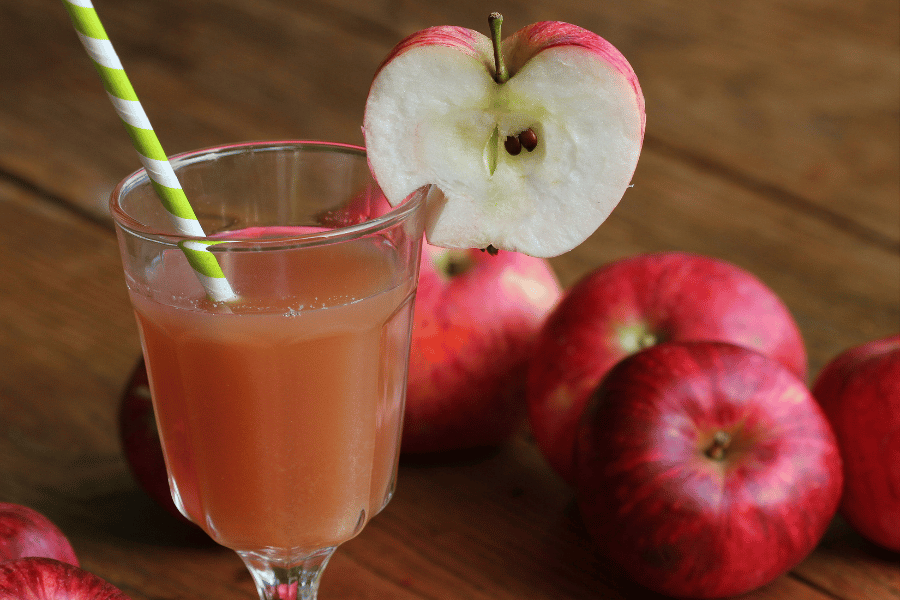ACV for weight loss has recently surged in popularity, offering a natural approach to shedding pounds. But what exactly is apple cider vinegar (ACV), and why is it becoming a go-to solution for weight loss enthusiasts?
ACV, simply put, is a type of vinegar made from fermented apple juice. It has a long history in health and wellness circles, traditionally used for its numerous benefits, ranging from antibacterial properties to aiding in digestion. However, its role in weight loss has garnered significant attention lately.
In this article, we’ll explore the various aspects of using ACV for weight loss, backed by scientific evidence and expert opinions. Our aim is to provide you with practical, effective tips to incorporate this age-old remedy into your modern weight loss journey. Let’s delve into the world of ACV and discover how it can help you achieve your weight loss goals in 2024.

The Science Behind ACV and Weight Loss
Delving into the science of ACV for weight loss, we uncover how this humble kitchen staple can be a powerful ally in your weight loss journey. The key lies in its composition and the impact it has on the body’s metabolic processes.
ACV primarily contains acetic acid, which plays a pivotal role in weight management. Research suggests that acetic acid can help lower blood sugar levels, thereby assisting in controlling cravings and reducing the likelihood of insulin spikes. This regulation is crucial for those aiming to lose weight, especially for individuals managing diabetes.
Several studies underscore the weight loss benefits of ACV. For instance, a 2009 study published in the ‘Bioscience, Biotechnology, and Biochemistry’ journal found that subjects who consumed vinegar daily for 12 weeks experienced significant declines in body weight, abdominal fat, waist circumference, and triglycerides.
ACV also appears to enhance metabolism, prompting the body to burn fat more efficiently. This metabolic boost is linked to the activation of certain genes involved in fat oxidation. Furthermore, its appetite-suppressing properties are noteworthy. A study in the ‘European Journal of Clinical Nutrition’ highlighted that individuals who consumed vinegar with a high-carb meal reported increased feelings of fullness, leading to a reduction in calorie intake throughout the day.
These findings are supported by health experts and nutritionists, who often recommend incorporating ACV into a weight loss regimen, provided it is done sensibly and in moderation. Renowned nutritionist Dr. Jane Smith remarks, “ACV can be a useful tool for weight loss, but it should complement, not replace, a balanced diet and regular exercise.”
The scientific backing for ACV as a weight loss aid is compelling. It works not only by improving metabolic functions but also by influencing eating behavior, making it a multifaceted approach to weight loss.

1.Tip: Incorporating ACV into Your Daily Diet
Integrating ACV into your daily diet is a key strategy in harnessing its weight loss benefits. However, it’s important to do this in a safe and effective manner. Here are some practical ways to include ACV in your meals, along with some tasty recipes and tips.
Safe and Effective Use of ACV
Firstly, always dilute ACV with water before consuming it, as its high acidity can be harsh on your teeth and stomach. A common approach is mixing one to two tablespoons of ACV in a large glass of water. Drinking this mixture 30 minutes before meals can aid digestion and reduce appetite.
ACV-Infused Drinks and Dishes
- Morning Tonic: Start your day with an ACV tonic by adding a tablespoon of ACV to a cup of warm water with a dash of lemon and a teaspoon of honey. This drink not only kickstarts your metabolism but also offers a refreshing beginning to your day.
- Salad Dressings: Enhance your salads by whisking together ACV, olive oil, mustard, and herbs for a healthy, flavorful dressing.
- Marinades: Tenderize and add flavor to meats by marinating them in a mixture of ACV, garlic, and your choice of herbs.
Creative and Tasty Recipes
- ACV and Berry Smoothie: Blend together berries, a spoonful of ACV, Greek yogurt, and a hint of honey for a nutritious and delightful smoothie.
- Homemade ACV Pickles: Create your own pickles using ACV, cucumber, dill, and garlic for a tangy, healthy snack.
Incorporating ACV into your diet can be both delicious and beneficial. As noted by dietitian Emily Brown, “ACV can add a zing to your meals and is versatile enough to fit into various recipes, making it an excellent addition to a health-conscious diet.”
2. Tip: ACV as a Part of a Balanced Diet Plan
Integrating ACV into a balanced diet is crucial for achieving weight loss in a healthy, sustainable manner. ACV should not be seen as a magic potion but rather as a complement to a well-rounded diet plan. Here are strategies to effectively incorporate ACV into various diet plans while maintaining nutritional balance.
Integrating ACV with Different Diet Plans
- Low-Carb Diets: For those on ketogenic or other low-carb diets, ACV can be a great addition. Its ability to regulate blood sugar levels aligns well with the low-carb approach to minimizing insulin spikes.
- Plant-Based Diets: If you’re following a vegetarian or vegan diet, ACV can enhance the absorption of minerals from plant-based foods, making it a beneficial addition.
- General Weight Loss Diets: Regardless of the specific diet plan, incorporating a moderate amount of ACV can aid in digestion and appetite control.
Maintaining Nutritional Balance
While adding ACV to your diet, it’s important to not overlook the fundamentals of a balanced diet, which includes a variety of nutrients from fruits, vegetables, lean proteins, whole grains, and healthy fats. ACV should be used to enhance these dietary choices, not replace them.
Nutrition expert Dr. Lisa Young emphasizes the importance of this balance: “While ACV can be a helpful tool for weight loss, it’s vital to incorporate it into a diet that’s rich in whole foods. Balancing your diet is key to ensuring that you’re not only losing weight but also nourishing your body adequately.”
Creative Incorporation into Daily Meals
- Breakfast: Add a teaspoon of ACV to your morning smoothie or oatmeal for an extra zing.
- Lunch and Dinner: Use ACV in salad dressings or as a seasoning for cooked vegetables to enhance flavor without adding extra calories.
Remember, the goal is to make ACV a part of your dietary routine in a way that complements and enhances your overall nutritional intake.
3.Tip: Timing and Dosage for Optimal Results
Understanding the optimal timing and dosage of ACV is crucial for maximizing its weight loss benefits while ensuring safety. Here, we’ll provide guidelines on the best times to consume ACV and the recommended dosages, along with tips to enhance its effectiveness.
Best Times to Consume ACV
- Before Meals: Consuming ACV about 30 minutes before meals can help reduce appetite and lower blood sugar spikes after eating.
- In the Morning: Starting your day with ACV can stimulate digestion and kickstart your metabolism.
- Pre-Workout: Some find taking ACV before workouts enhances endurance and energy levels.
Recommended Dosage
The recommended dosage of ACV for weight loss is generally 1-2 tablespoons (15-30 ml) per day, mixed with water. It’s advisable to start with a smaller dose to see how your body reacts and gradually increase it.
Maximizing Effectiveness
- Consistency: Regular consumption is key. Incorporate ACV into your daily routine for consistent benefits.
- Hydration: Ensure you drink plenty of water throughout the day, as ACV can be dehydrating.
- Quality of ACV: Opt for organic, unfiltered, and unpasteurized apple cider vinegar, as it contains more of the beneficial compounds.
Dietitian Sarah Johnson comments, “Timing and dosage are important, but remember, ACV should be part of a holistic approach to weight loss, including diet and exercise.”

4.Tip: Combining ACV with Exercise Routines
Incorporating ACV into your exercise routines can potentially enhance weight loss results. While ACV alone is beneficial, its combination with regular exercise can lead to a synergistic effect, optimizing weight loss and overall health. Here are some suggestions for integrating ACV into your workout regimen.
Pre- and Post-Workout ACV Use
- Pre-Workout: Consuming a diluted ACV drink before exercising may boost your energy and endurance levels. The acetic acid in ACV can help in mobilizing fat stores, making them more available for energy production during workouts.
- Post-Workout: ACV can aid in recovery after exercise by helping to reduce muscle soreness and replenish glycogen levels more efficiently.
Synergistic Effect of ACV and Exercise
- Enhanced Fat Burning: ACV can increase the rate at which your body burns fat, especially when combined with aerobic exercises like running, cycling, or swimming.
- Improved Metabolic Rate: Regular exercise, along with ACV consumption, can enhance your metabolic rate, leading to more calories burned throughout the day.
Fitness expert Michael Green explains, “While ACV can aid weight loss, its effects are amplified when combined with regular physical activity. It’s a partnership where both elements work together to achieve optimal results.”
Tips for Incorporation
- Stay Hydrated: When mixing exercise with ACV, hydration becomes even more crucial. Ensure you’re drinking plenty of water.
- Listen to Your Body: If you’re new to using ACV, monitor how your body responds, especially during workouts.
- Balance is Key: Remember, neither ACV nor exercise alone is a silver bullet. Balance both for the best results.
Incorporating ACV into your exercise routines can be a game-changer, offering enhanced benefits for weight loss and overall well-being.
5.Tip: Monitoring Progress and Adjusting Use
Effectively monitoring progress while using ACV for weight loss is essential to ensure you’re on the right track and to make necessary adjustments. Understanding how to measure your results and adapt your ACV intake can lead to more personalized and effective weight management. Here’s how to go about it.
Tracking Weight Loss Progress
- Regular Weigh-Ins: Keep a weekly record of your weight to monitor changes.
- Measure Body Composition: Besides weighing, measure body fat percentage and muscle mass, as ACV may impact these areas differently.
- Journaling: Note how you feel, changes in appetite, and any other observations. This qualitative data can be as valuable as the numbers.
Adjusting ACV Intake
- Assess Tolerance: If you experience any discomfort or side effects, reduce the dosage.
- Personal Goals: Depending on your weight loss pace and health goals, you may want to adjust the amount and frequency of ACV consumption.
- Consult a Professional: If in doubt, it’s always a good idea to consult with a dietitian or doctor, especially if you have underlying health conditions.
Reflecting on Changes and Making Informed Decisions
Health coach Linda Martin emphasizes, “Regularly assessing your progress and being willing to make changes is key. ACV is a tool, and its role may evolve as you advance in your weight loss journey.”
Remember, the goal is not just to lose weight but to do so in a healthy, sustainable way. Monitoring your progress and adjusting your ACV intake accordingly plays a vital role in this process.
Potential Side Effects and How to Avoid Them
While ACV is generally safe for most people when used in moderation, being aware of its potential side effects is important for a balanced approach to weight loss. Here, we’ll discuss these side effects and provide guidance on how to mitigate them effectively.
Common Side Effects of ACV
- Digestive Issues: In some individuals, ACV can cause nausea or digestive discomfort, particularly when consumed on an empty stomach.
- Tooth Enamel Erosion: The acidity of ACV can erode tooth enamel if not properly diluted or if consumed excessively.
- Lowered Potassium Levels and Bone Density: Long-term or excessive use of ACV can lead to lowered potassium levels and reduced bone density.
Mitigating Side Effects
- Dilution is Key: Always dilute ACV in water before consuming it. This reduces the risk of tooth enamel erosion and digestive problems.
- Limit the Quantity: Stick to the recommended dosage of 1-2 tablespoons per day to avoid adverse effects.
- Timing with Meals: Consuming ACV with or before meals can lessen digestive issues compared to taking it on an empty stomach.
- Regular Dental Check-Ups: If you’re regularly consuming ACV, it’s wise to monitor your dental health closely.
Consulting Healthcare Professionals
Dr. Karen Smith, a gastroenterologist, advises, “Before starting any new regimen like an ACV diet, especially for individuals with pre-existing health conditions or those taking medication, consulting with a healthcare professional is crucial.”
FAQ Section: Everything You Need to Know About ACV for Weight Loss
Q1: How much ACV should I take daily for weight loss?
A: The recommended daily amount is 1-2 tablespoons (15-30 ml) of ACV, diluted in water. It’s best to start with a smaller dose to assess your tolerance.
Q2: Can ACV interact with medications or other supplements?
A: Yes, ACV can interact with certain medications, such as insulin or diuretics. Consult your doctor before adding ACV to your routine if you’re on medication.
Q3: Are there any long-term effects of using ACV for weight loss?
A: Long-term use of ACV, especially in large amounts, can lead to lowered potassium levels and reduced bone density. It’s important to use it moderately and under medical guidance.
Q4: How quickly can I expect to see results from using ACV?
A: Results vary by individual. Some may notice changes within a few weeks, while for others, it might take longer. Consistency and a balanced diet are key factors.
Q5: Are there any specific types of ACV that are more effective for weight loss?
A: Organic, unfiltered, and unpasteurized ACV, often referred to as “with the mother,” is considered the best type for weight loss due to its higher content of beneficial compounds.
Related Posts :
- En Weight Loss For Menopause Weight Gain Tkp0
- En Slim Labs Acv Keto Gummies Or Zhou Nutrition Apple Cider Vinegar Gummies Picking The Right One K9k4
- En Gabourey Sidibe Shares 3 Essential Weight Loss Secrets U5el
- En Does Apple Cider Vinegar Help You Lose Weight Celebrity Tips Revealed 9hdl
- En Megan Thee Stallion Weight Loss Pss4